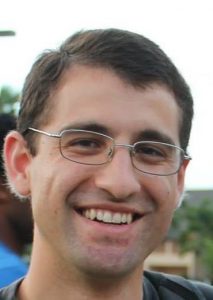How would your studies and / or your professional experiences advance the goals of WPA-GO? These goals may be found in the About Me section of WPA-GO’s website: http://wpacouncil.org/wpa-go (no more than 150 words) *
I follow the likes of Brian Jackson, Richard Gebhardt, and Jesse Jones in believing that writing program administration and teaching go hand in hand– the WPA is a teacher among teachers. For example, when I prepared and taught a certification course for language tutors at my undergraduate institution, while I drew on my own experiences as a tutor, I also included assignments asking tutors to contribute their own experiences and resources to our collective training efforts.
To support WPA-GO in the goal of WPA preparation for graduate students, I would encourage similar thinking. I would encourage graduate students to consider how becoming a better teacher– for example, by observing peers– counts towards WPA preparation. I would also publicize professional development opportunities while also prompting fellow graduate students to share what they’ve learned on their own, in their professional development endeavors, and in their mentorship opportunities.
What kinds of support do you value as a graduate student and how would you further those forms of support for others through WPA-GO? (no more than 250 words) *
As a graduate student and instructor, I value resource sharing. For example, I still turn to materials crowdsourced by fellow graduate instructors at my previous institution, because they have so many great teaching ideas! While in some ways the WPA listserv acts as a knowledge base and information sharing space, I believe it would be valuable to also develop (or, if it already exists, maintain and advertise) our WPA-GO Resource page to include a link to a wiki where we could collect materials we find useful for WPA preparation. These materials could include annotated bibliographies / white papers, observation forms, WPA-GO newsletters, reports and reflections on what we learn in our mentorships, and links to professional development opportunities within and outside of CWPA. By sharing the knowledge we’ve gained, we can learn from one another and have more resources to share with potential WPA-GO members.
CWPA pledges to “foster inclusion more generally; promote research into student diversities; promote policies that increase diversity in our membership and in the population of people who administer writing programs; and explicitly act against the structures that cause injustice today,” and WPA-GO is dedicated to supporting this mission. How will your selection to the WPA-GO Graduate Committee advance these goals? Please answer this question by choosing one barrier you identify to meeting these goals in writing studies. How would your work within WPA-GO specifically address this barrier? (no more than 500 words) *
As writing programs are pressured to do even more in writing classrooms to respond to university-wide initiatives, I’ve come across programs that place great emphasis on learning the conventions of academic discourse. For these programs, first-year writing is seen as a gateway to the academic discourse community– at least until junior or senior year. While these are both valid approaches to writing instruction, these models often mean that students’ pre-college literacies are not sufficiently valued, and students learn writing conventions for the university rather than for the jobs they already have. Such approaches run the risk of perpetuating biases against diverse writers of all stripes.
I’ve had the privilege of teaching at a university that had recently transitioned from being a community college. Their project-based curriculum for basic writing introduced me to an approach that valued and leveraged students’ multiliteracies in a meaningful way, and culminated in a community project proposal rather than a traditional research paper. Watching my basic writing students perform just as well as my advanced students at other universities taught me that all students have a great potential to be proficient writers, if only they are given assignments that are meaningful and relevant to them in their worlds, not just our world.
That experience suggested to me as well that an important part of counteracting bias is to trust our students, to respect their current abilities and potential, to ask not what is wrong with them, but ask what may be amiss with us. Working with WPA-GO, I would support workshops and other initiatives to foster critical awareness of our own biases and privileges. I would also emphasize that a single training is not enough– biases are complicated things, privileges are not always admitted. In all our efforts to teach awareness, I would support reflective practices to craft more compassionate, affirming teaching, as well as call for continued efforts to connect with and influence students who might be harboring ill-will towards their peers.
